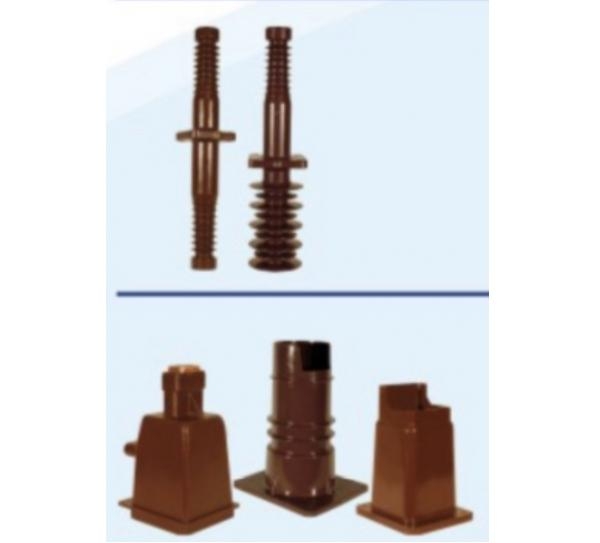|
News
Poll
Currency Status
Weather Forecast
Counter
 |
Günlük Ziyaretçi |
: 199 |
 |
Toplam Ziyaretçi |
: 494627 |
|
EPOXY INSULATORS AND BUSHINGS
Please ask for catalog to sales@transformer-switchgear.com
Please check more product details at www.epoxy-insulator.com

Epoxy resins are widely used in the electrical and electronic industries due to their excellent insulating properties, resistance to heat and chemicals, and mechanical strength. Epoxy insulators find applications in various electrical devices and systems, including power distribution, transformers, and electronic circuits.
Here are some key features and applications of epoxy insulators:
Features:
-
Insulating Properties: Epoxy resins provide high dielectric strength, making them effective insulators to prevent the flow of electric current.
-
Thermal Stability: Epoxy insulators can withstand elevated temperatures, making them suitable for applications where heat resistance is essential.
-
Chemical Resistance: They resist the effects of various chemicals, ensuring long-term stability in different environmental conditions.
-
Mechanical Strength: Epoxy insulators offer good mechanical properties, including high tensile strength and resistance to impact.
-
Moldability: Epoxy resin can be molded into various shapes, allowing for the customization of insulating components.
Applications:
-
Power Distribution: Epoxy insulators are used in power distribution systems, such as switchgear and transformers, to provide electrical insulation.
-
Electronic Components: They are employed in electronic circuits and devices to prevent electrical conductivity between different components.
-
High-Voltage Equipment: Epoxy insulators are suitable for high-voltage applications due to their excellent dielectric properties.
-
Outdoor Insulation: Epoxy insulators are often used in outdoor environments where exposure to weather conditions is a consideration, as they are resistant to moisture and UV radiation.
-
Busbar Supports: Epoxy insulators can be used as supports for busbars in electrical panels and distribution boards.
These insulators contribute to the overall reliability and safety of electrical systems by preventing unintended electrical connections and ensuring proper insulation.
Epoxy insulators are commonly used in electrical and electronic applications for their specific advantages. Here are some of the key advantages of epoxy insulators:
-
High Dielectric Strength:
- Epoxy insulators exhibit high dielectric strength, allowing them to resist electrical breakdown even in high-voltage applications. This property is crucial for maintaining insulation integrity in electrical systems.
-
Excellent Electrical Insulation:
- Epoxy resin provides excellent electrical insulation properties. It helps prevent the flow of electric current, reducing the risk of short circuits and electrical faults.
-
Resistance to Environmental Factors:
- Epoxy insulators are resistant to various environmental factors such as moisture, chemicals, and UV radiation. This makes them suitable for outdoor applications where exposure to weather conditions is a concern.
-
Corrosion Resistance:
- Epoxy insulators are resistant to corrosion, making them suitable for use in harsh environments or areas with high levels of humidity. This property contributes to the long-term reliability of the insulator.
-
Mechanical Strength:
- Epoxy insulators often have good mechanical strength, providing resistance to mechanical stress, vibration, and impact. This makes them durable and capable of withstanding physical stresses in different applications.
-
Lightweight:
- Epoxy insulators are generally lightweight compared to some other insulation materials. This can be advantageous in applications where weight is a critical factor.
-
Ease of Molding and Forming:
- Epoxy resin can be easily molded into various shapes and forms, allowing for the manufacturing of insulators with complex geometries. This flexibility in design contributes to their versatility in different applications.
-
Thermal Stability:
- Epoxy insulators often exhibit good thermal stability, maintaining their properties across a wide temperature range. This is essential for applications where temperature variations are significant.
-
Low Water Absorption:
- Epoxy insulators typically have low water absorption rates, which helps maintain their electrical and mechanical properties over time. Low water absorption contributes to the insulator´s reliability in humid conditions.
-
Chemical Resistance:
- Epoxy insulators resist the effects of various chemicals, protecting them from degradation when exposed to corrosive substances. This chemical resistance enhances their suitability for diverse industrial environments.
-
Easy to Install:
- Epoxy insulators are often easy to install due to their lightweight nature and compatibility with different installation methods. This can lead to faster and more straightforward installation processes.
-
Long Service Life:
- The combination of the above properties contributes to the long service life of epoxy insulators, making them a reliable choice for various electrical and electronic applications.
While epoxy insulators offer these advantages, the selection of insulating materials should always consider the specific requirements of the application, industry standards, and safety regulations.

|








